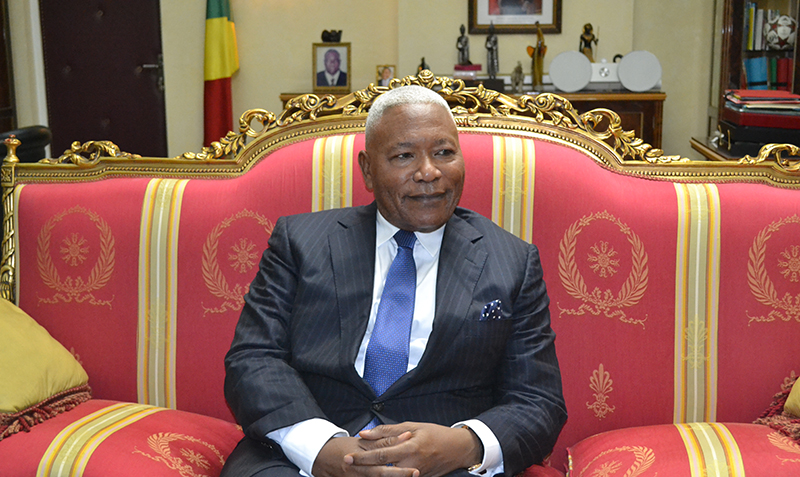Minister of State for Industrial Development and the Promotion of the Private Sector, Isidore Mvouba, tackles the challenge of economic diversification by attracting investors to develop unexploited sectors such as manufacturing

The Republic of the Congo is in the midst of a rapid and extensive development program, as it uses its strategic location and growing infrastructure to embrace foreign investors to its increasingly diversified economy.
The Central African country had traditionally relied on oil revenues to support its economic growth but under the tutelage of President Denis Sassou Nguesso, Congo is now expanding its potential as one of Africa’s best places for businesses by introducing new legislation and cutting unnecessary administrative red tape.
Many of the recent developments have come during the past six years, since the country’s been working with the European Union on an over-arching strategy to improve the climate for business. Minister of State for Industrial Development and the Promotion of the Private Sector, Isidore Mvouba, says the country has much going for it.
“The Republic of the Congo is politically stable and has a favorable socio-economic situation,” he explains, adding that the World Bank reported growth of around 5% in 2013.
To continue this expansion, he has created a number of bodies to promote the African nation on the international stage, including the Office of the Public-Private Dialogue Council and the Agency for Investment Promotion (AIP).
The latter is headed up by executive director Annick Mongo, who agrees that the Republic of the Congo’s political and economic stability – and the benefits it derives from its geographical location – provides it with three immediate advantages over some of its near-neighbors.
“The Congo is really the gateway to Central Africa,” she says. “We have the only deep water port in Central Africa and have established a logistics hub, as we have the largest airport in Brazzaville, and one in Pointe-Noire. And we have other regional airports as well.”
The AIP has also helped to generate discussions over how best to increase foreign interest in the country since the agency’s formation in 2014 and Mrs. Mongo, a lawyer of 25 years, has put assisting investors and encouraging entrepreneurs at the center of its targets.
AIP seminars and training have helped to develop young people’s interest in the business environment while the group is also looking outwardly to foreign investors to ensure the opportunities the country offers are recognized.
As part of these plans the Republic of the Congo has been reforming large swathes of its fiscal policy in an attempt to develop and encourage sustained prosperity. The country’s growth rate stood at 3.4% in 2014 and is expected to increase to between 5% and 6% in 2015. And as Jean Pinda Niangoula, Director General of the Agency for Promotion of the Private Sector explains, the goal now is to encourage investment across industries and reduce the reliance on oil.
“The government’s concern now is to diversify the economy to create jobs,” he explains. “It is more than important to take advantage of this stability to give more jobs to young people in order to achieve social stability.”
Mr. Niangoula, whose agency is targeting a triumvirate of increasing foreign direct investment, greater enterprise opportunities, and increasing cooperation between the private and public sectors, is also keen to ensure international investors recognize the difference between his country and the Democratic Republic of the Congo. It seems the message is getting through, however, with interest already growing among multinationals. Reforms to taxation levels on company profits, which are set to fall from 34% to 25% by 2017, and initiatives offering low and in some cases tax-free incentives to certain industries such as healthcare, education and agriculture, are also catching international attention.
“It’s a great package,” Mrs. Mongo adds, who says the AIP is providing assistance to both national and foreign companies to guide them through the regulatory changes. Numerous industries, including timber and mining, are set to benefit while the potential of the country’s agriculture industry is clear. With just 2% of 24.7 million acres of fertile land currently being worked, and government bodies keen to reduce high food imports, the requirement of foreign investment and the potential for growth is evident.
Elsewhere special economic zones have been created to boost diversification across a number of sectors. These include mining, forestry, agricultural, financial, industrial and tourism, with zones already created in Brazzaville, Black Ouesso and Oyo Olombo, providing what Mr. Niangoula says are fertile grounds for cross-industry growth.
“The Congo’s economy is based 62% on oil, other sectors are low,” he explains. “The prospect of 2016-2017 is to improve the mining sector to around 25% contribution to GDP, in order to reduce oil to 52%.” The republic is also looking to bolster relationships with countries such as France and China, and further develop its business ties with companies and consumers in the U.S.
“As a world power it is obviously a very important country with which we work. If you look at the statistics, you can see that the U.S. is one of the three main countries with which we work,” Mrs. Mongo says, adding that Italy is also a key partner.
Other government efforts to cut red tape around business enterprises are helping to deal with some preconceptions of investing in the country. New regulations have reduced the time it takes to formally set up a new business enterprise, bringing the timeframe to just 48 hours, while initiatives such as ensuring businesses can connect to electricity within four days have also been introduced. Import and export rules have also been reformed, again with the intention of signaling to the world that the Republic of the Congo is not just open for business but ready and able to participate.
0 COMMENTS